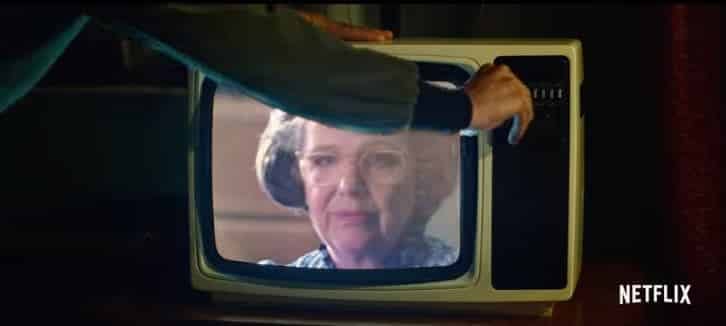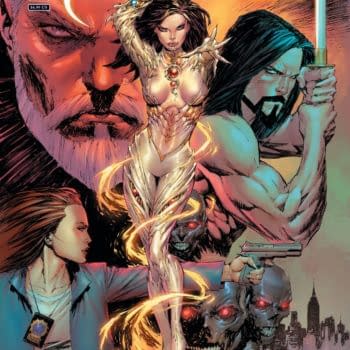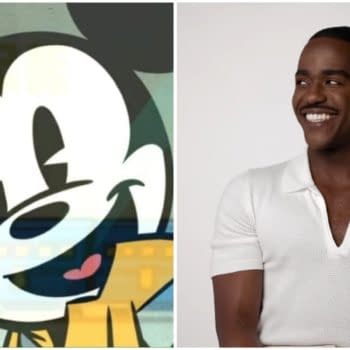Posted in: Netflix, Trailer, TV | Tagged: bandersnatch, black mirror, bleeding cool, cable, charlie brooker, choose your own adventure, FMV, Full Motion Video, interactive, Late Shift, Mystery, netflix, streaming, television, the bunker, The Infectious Madness of Doctor Dekker, thriller, tv, video games
Black Mirror: Bandersnatch – To Watch or Play? That Is The Question
Netflix's Black Mirror: Bandersnatch was the most hyped thing this weekend. The main character Stefan Butler is a 19-year-old games developer in 1980's Britain who becomes obsessed with making a multipath game in time for shipping. How bad it gets for him depends on the choices you make.
https://youtu.be/XM0xWpBYlNM
This felt like Charlie Brooker crossing an item off his bucket list. He gets to revisit his youth in the 1980's when games were a whole new frontier to all of us who were kids then. Bandersnatch is his imagining an alternate history for a much-hyped game that never surfaced. It's a chance to pay homage to the Full Motion Video (FMV) Choose Your Own Adventure computer games that became popular in the 80's and 90's, even if the majority of them were not very good. I was reminded of games like Police Quest, the Gabriel Knight games, the unspeakably bad Night Trap, and especially the Phantasmagoria games, whose themes of mental illness, violence, paranoia and supernatural horror were seemingly referenced to in Bandersnatch.
Of course, there's the overriding Black Mirror theme: that technology is great, but it's also going to be an extension of how messed up we are and how we'll use it to mess up our lives.

Thankfully, the writing of Bandersnatch is a lot better than the FMV games of yesteryear. Bandersnatch also runs on much more powerful processors so it can be in High Def rather than really crappy video on primitive computers. It also gets to be more meta and make references about free will, alternate timelines, and existential ideas about whether the characters are really living in computer program – in this case, they are! Colin Ritman, the game dev that Stefan idolizes knows when you've restarted the game and makes remarks as such. He initiates Stefan into the rabbit hole of obsession in games development and has the air of a Grant Morrison – like character who has half a step outside Time and Space.
The existence of at least five different endings – and rumours of a sixth – with one considered the "true" ending is a reference to Japanese video games like Silent Hill, next to the "good" ending, the "bad" ending and the wacky ending. In the Silent Hill games, the latter usually involves UFOs and the hero's dog turning out to be behind it all. You can easily look up what the wacky ending of Bandersnatch is: it's been spoiled by more than enough sites out there.
Of course, with games and Choose Your Own Adventure stories, choice is really an illusion. Stories are always predetermined. You're only choosing the available paths the writers created for you. Some things need to happen for the story to progress, so even if you choose not to have Stefan do them, they'll happen to him anyway.
I've seen some reviewers complain that this show/game isn't that deep. Well, FMV games are never deep or subtle. You want depth and nuance, you read a Russian novel. You play an FMV to mess around and see what kind of bad stuff happens if you make the nasty choice. This includes deciding how far Stefan gets to do some Oedipal acting out against his dad, with whom he has some anger issues.
Bandersnatch came at a time when there's a minor revival of the FMV game, even if it's mostly from a single British games company called Wales Interactive. They've put out four recent titles with higher production values than the FMV games of old: The Bunker, Late Shift, and The Infectious Madness of Doctor Dekker. I've played Late Shift, which is the slickest of the lot and the closest in design to Bandersnatch, an interactive movie where you also choose the main character's actions. It touches upon the existential nature of choice and free will but not as far as Bandersnatch does. This feels like a minor trend, a comeback for the FMV driven by nostalgia.
The big theme in Bandersnatch is free will and whether Stefan has any – and on a larger scale, whether we as the viewer/player have any, too. Apparently, if you don't make any decisions, the show will pick a decision for you (just like Late Shift does, in fact) and you can pretty much just watch through one ending, then be shown the other endings. This is if you choose not to play but just watch. But even here, you're not really in charge: the moment you press "play", you're in Netflix' hands.
So if you're wondering who's really in charge here, it's Charlie Brooker. Again.















